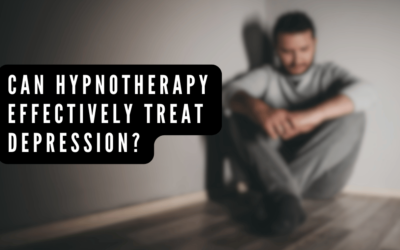You’ve probably tried these to quit smoking:
- Patches
- Gums
- Nicotine replacement therapy
- Sheer willpower
…but nothing seems to stick.
The cravings, the triggers, the stress — it’s exhausting, right?
You’re not alone. Many smokers feel trapped, as if cigarettes have taken over their lives. But there’s another approach that taps into the root of your smoking habits and addresses it from the inside out.
Hypnosis offers a unique solution, one that works by rewiring how your brain responds to smoking triggers. It doesn’t just focus on breaking the physical addiction to nicotine—it also deals with the psychological hold smoking has on you.
What Is Hypnosis?
Hypnosis is a state of focused attention and deep relaxation, where you become more open to suggestions.
During a hypnosis session, the hypnotherapists use specific techniques to access the subconscious mind. This is where habits, automatic behaviors, and even emotional triggers related to smoking reside.
The goal of clinical hypnosis is to change ingrained behaviors and thought patterns that support smoking addiction, helping you replace them with healthier choices.
How Hypnosis Affects the Brain
During hypnosis, brain activity shifts in a way that reduces critical thinking and increases focus on suggestions.
Research shows that areas of the brain associated with attention and control are more active during hypnosis. This allows new thought patterns to form, which can help break addictive behaviors like smoking.
When you’re in this state, your mind is more receptive to the idea of quitting smoking, which can help you break free from the automatic behaviors that make it harder to stop.
Understanding Smoking Addiction
Smoking addiction has two main components:
- Physical
- Psychological
Physical Component
Physically, nicotine hooks your brain by releasing dopamine, the “feel-good” chemical, creating a temporary sense of pleasure and relaxation.
But once that effect wears off, your brain craves more, driving you to light up again.
Psychological Component
Beyond the physical cravings, smoking is also deeply tied to habits and emotions. Many smokers reach for a cigarette in response to
- Stress
- Boredom
- As a reward
Over time, smoking becomes linked with certain triggers, like drinking coffee, driving, or socializing.
This makes it tough to quit without addressing these mental associations.
Why Is It So Hard to Quit Smoking?
Quitting smoking is hard because it’s not just about kicking a physical addiction…
It’s about breaking a deeply ingrained routine and emotional attachment. Even when you’re motivated to quit, stress, social pressure, and withdrawal symptoms can make it easy to slip back into old habits.
Does Hypnosis for Smoking Work?
Hypnosis helps by targeting both the physical and mental aspects of smoking. Instead of just dealing with nicotine withdrawal, hypnosis works on changing the underlying thought patterns and emotional triggers that make you reach for a cigarette in the first place.
By reprogramming how your brain associates smoking with stress relief or pleasure, hypnosis can make the habit feel less automatic and less appealing.
Success Rates of Hypnotherapy for Quitting Smoking
There is reliable evidence that shows how hypnosis may help smokers quit.
- A 2017 research review found that combining hypnosis with other treatments may help enhance their effectiveness.
- In another 2017 study of people who had quit smoking for at least three days, researchers found that more participants remained smoke-free after 26 weeks when they received hypnosis as a preventative treatment compared to those who received behavioral therapy.
- A 2021 study showed that 86% of participants had quit smoking after six months of hypnosis. However, only 32% stayed smoke-free after that period.
Research has reported success rates between 20% and 35%.
The studies above show the effectiveness of hypnosis in quitting smoking, which I have also seen in my decade of work as a hypnotherapist.
Benefits of Hypnosis for Smoking Cessation
Here are some of the benefits of hypnosis to quit smoking.
Reduced Cravings and Nicotine Withdrawal
One of the biggest benefits of hypnosis is its ability to reduce cravings and manage withdrawal symptoms. By shifting how your mind perceives smoking, hypnosis can make the urge to smoke feel less overpowering, helping you manage the initial phases of quitting.
Behavior Modification and Breaking the Habit Loop
Smoking often becomes a habit tied to daily routines—whether it’s having a cigarette with your morning coffee or during a break at work. Hypnosis helps break these associations by making you more aware of your triggers and providing mental tools to overcome them.
Stress Relief and Emotional Support
Quitting smoking can be stressful, which is why many people relapse when life gets tough. Hypnosis often includes relaxation techniques that not only reduce stress but also provide emotional support during the process.
This can be particularly helpful if you’ve used smoking as a way to cope with anxiety or negative emotions.
Enhancing Motivation to Quit
If you have tried to quit smoking a couple of times, you know how motivation can fluctuate. Hypnosis helps boost your determination by reinforcing your desire to quit and visualizing the positive outcomes of a smoke-free life.
This mental reinforcement can keep you on track, even when cravings hit.
Long-Term Habit Change
While some smoking cessation programs focus on short-term results, hypnosis aims for long-term change by addressing the root causes of your addiction. Hypnosis changes your mindset around smoking, which in turn helps prevent relapses and support lasting behavior change.
Risks and Limitations of Hypnosis
While hypnotherapy to quit smoking is effective, it’s important to understand the risks.
Individual Responsiveness Matters
Not everyone responds to hypnosis in the same way, and some people may need more sessions or a combination of treatments to achieve the best results.
People respond differently to hypnosis based on factors like their:
- Openness to the process
- Their level of addiction
- The skills of their hypnotherapist
Some individuals may experience immediate benefits, while others might need more time and practice to see results.
Potential for Misleading Claims
Many practitioners may over-promise what hypnosis can do.
As a hypnotherapist myself, I have seen this play out. It’s important to work with a certified, reputable hypnotherapist and approach the hypnotic treatment with realistic expectations.
Methods of Hypnotherapy for Quitting Smoking
There are different ways to utilize hypnosis to quit smoking, including:
- Professional Hypnotherapy Sessions
A professional hypnotherapy session typically involves an initial consultation where your hypnotherapist learns about your smoking habits and your reasons for quitting.
They will guide you into a relaxed state and use suggestions to reframe your thoughts about smoking. Sessions usually last 60 to 90 minutes, and you may need several sessions depending on your progress.
- Self-Hypnosis Techniques
Self-hypnosis is a technique where you use the same principles of hypnotherapy on your own. You can learn self-hypnosis from a professional or through online resources, apps, and guides.
- Online Hypnosis Resources and Apps
There are many apps and online programs that offer guided hypnosis sessions specifically designed for smoking cessation.
These can be a convenient and cost-effective way to incorporate hypnosis into your quitting plan, though the effectiveness varies depending on the quality of the program.
What to Expect From Hypnotherapy
A typical hypnotherapy session starts with an induction phase, where the hypnotherapist helps you enter a relaxed, focused state.
Next, they’ll use suggestion therapy to help you reframe how you think about smoking.
Finally, they’ll bring you back to full awareness, often with a sense of calm and empowerment.
Typical Number of Sessions Required
The number of sessions you need varies.
Some people see results after just two or three sessions, while others may need ongoing treatment over several weeks or months to fully break the smoking habit.
How Long Does It Take to See Results?
Some people feel a reduction in cravings after just one session, while others may need multiple sessions before they notice a significant change. Like other smoking cessation methods, results vary, but hypnosis is designed to help create lasting change over time.
To maximize your sessions:
- Stay committed to quitting
- Recognize and avoid your triggers
- Continue with strategies provided by your hypnotherapist at home
Ready to Quit for Good? – The Best Time to Quit Is NOW!
If you’re serious about breaking free from smoking, hypnotherapy can provide a lasting solution. By working with a trained professional, you can take control of your cravings, triggers, and automatic behaviors.
And the best part?
You’ll be doing it in a way that reduces stress and improves your quality of life.
It’s time to stop fighting against your mind and start using it to your advantage. Let me show you how in a Free 20-minute consultation.
We’ll look at your challenges and provide you with the next steps to quit smoking for good.
FAQs
What is the current evidence supporting hypnotherapy for smoking cessation?
Research shows that hypnotherapy can be an effective tool for quitting smoking, especially when combined with other treatments. Studies have shown that individuals who received hypnotherapy as a preventative treatment remained smoke-free longer than those who received behavioral therapy.
What are the potential adverse effects of hypnotherapy for smoking cessation?
Hypnotherapy is generally considered safe, but some individuals might experience temporary discomfort or anxiety during the induction phase. It is essential to find a certified and reputable hypnotherapist to minimize risks and ensure a positive experience.
What are the benefits of hypnotherapy for smoking cessation compared to standard methods?
Hypnotherapy offers a unique approach to smoking cessation by addressing both the physical and psychological aspects of addiction. Compared to standard methods like nicotine replacement therapy, hypnotherapy can help reduce cravings, break habit loops, and provide emotional support, contributing to long-term habit change.
How long does it typically take to see results from hypnotherapy for smoking cessation?
The duration of hypnotherapy for smoking cessation varies depending on individual factors. While some people notice a reduction in cravings after a single session, others may require multiple sessions over several weeks or months to achieve lasting change. The effectiveness of hypnotherapy is enhanced by commitment to quitting, identifying and avoiding triggers, and continuing home strategies provided by the hypnotherapist.
Does hypnotherapy for smoking cessation work better than rapid smoking treatments?
While rapid smoking treatments aim to create aversion to smoking through rapid exposure, hypnotherapy focuses on changing the underlying thoughts and emotions associated with smoking. Hypnotherapy offers a more holistic approach to smoking cessation, addressing the psychological aspects of addiction alongside the physical ones.


